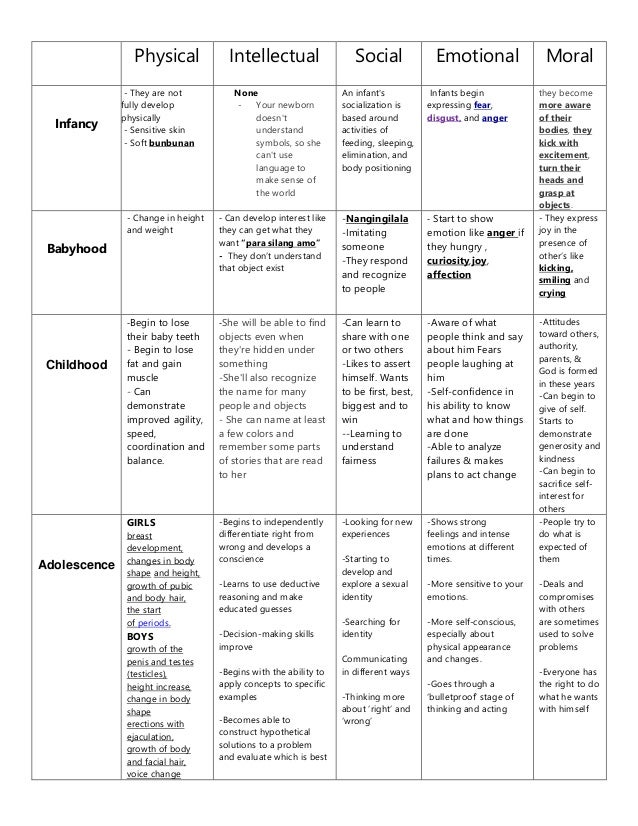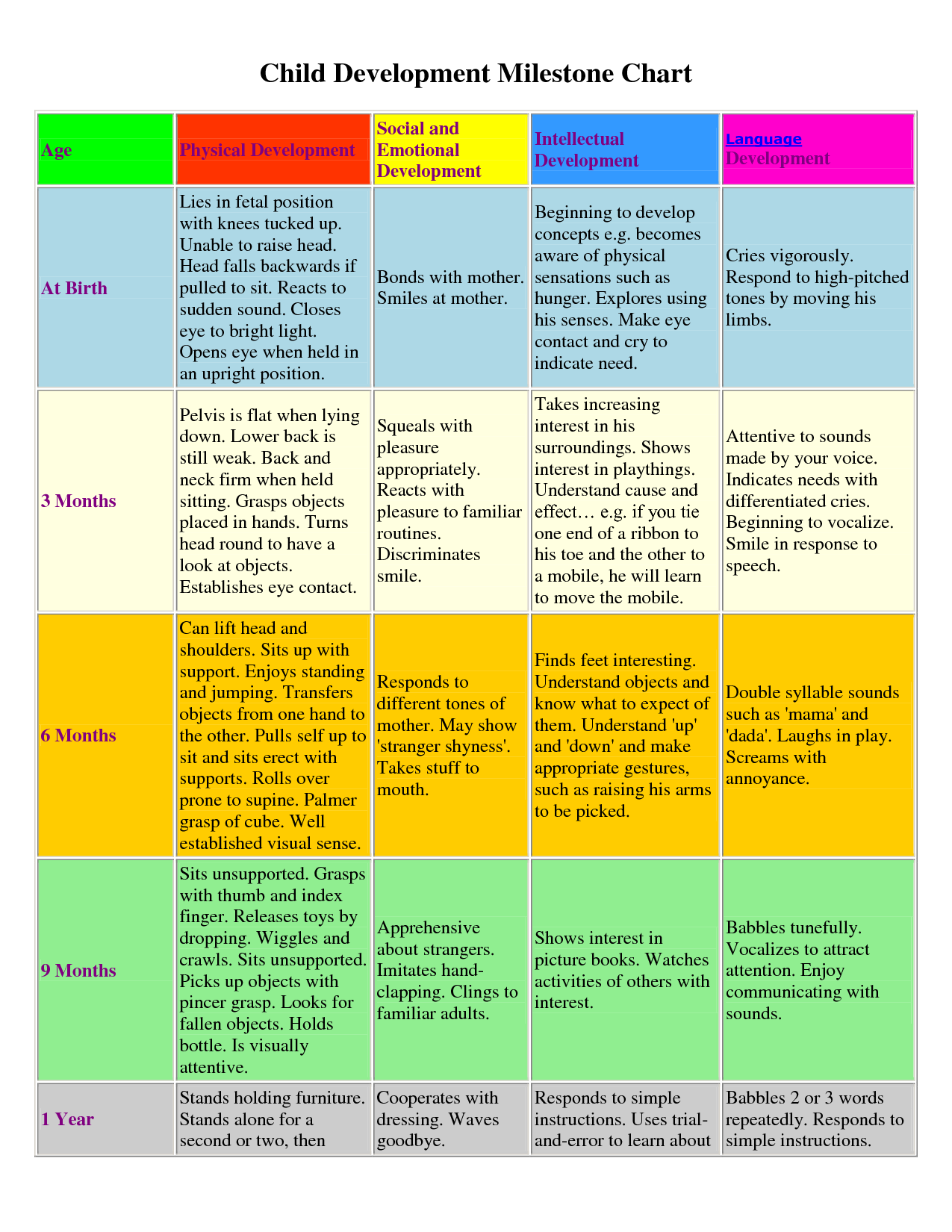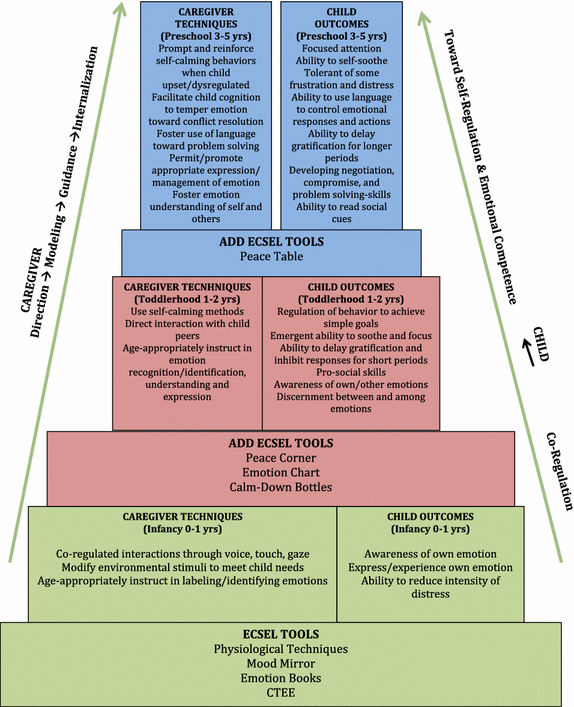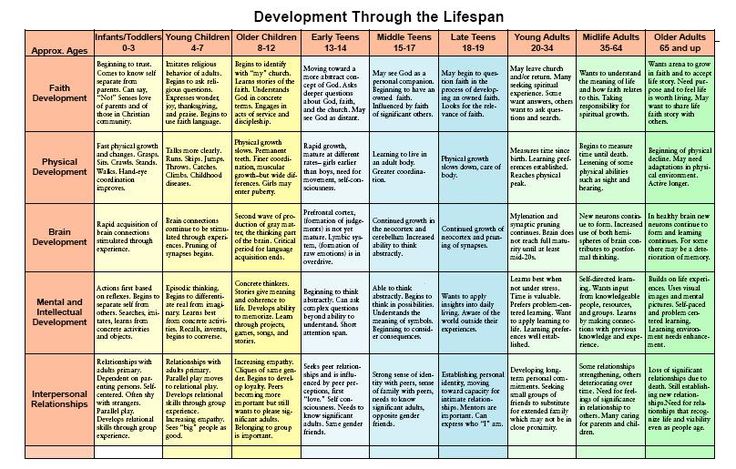
Improving Emotional Intelligence (EQ) Social-emotional development includes the child’s experience, expression, and management of emotions and the ability to establish positive and rewarding relationships with others (Cohen and others 2005). It encompasses both intra- and interpersonal processes.
Social Development Why It Is Important and How To Impact It
Social and Emotional Development in Early Childhood. Emotional intelligence refers to the ability to identify and manage one’s own emotions, as well as the emotions of others. Emotional intelligence is generally said to include at least three, Understanding emotional development: Providing insight into human lives . Article (PDF Available) · January 2014 with 1,929 Reads How we measure 'reads' A 'read' is counted each time someone.
Emotional learning begins at a very young age, as children discover a wide range of emotions, and evolves as they grow. This topic aims to provide a better understanding of the key stages of emotional development, its impacts, interrelated skills, and the factors that influence emotional competence. Stages of Emotional Development Infancy, childhood, adolescence as emergent socio-emotional affectional systems. Posted Jun 15, 2010
Chapter Three takes a closer look at factors in the home environment that could be addressed to support social and emotional development in young children. Chapter Four examines factors related to caregivers and child-care settings that could be addressed to support social and emotional development in … Social and Emotional Development of Children n California Training Institute n California Childcare Health Program n 1 LEARNING OBJECTIVES To describe the social and emotional development of young children. To identify why young children behave in diff erent ways.
Just as you prepare your children for the start of a new school year with the right school supplies and materials, it’s also important to think about their emotional health. Remember that children may not only be excited about the new school year, but also apprehensive about all the changes that come with growing up. Their emotional health is tied into their mental health and as their parent Emotional intelligence describes an ability, capacity, skill, or self-perceived ability to identify, assess, and manage the emotions of one's self, of others, and of groups. The theory is enjoying considerable support in the literature and has had successful applications in many domains. Understanding and Developing Emotional Intelligence By Olivier Serrat Introduction The intelligence
11/04/2018В В· What is emotional intelligence? It gives us the ability to read our instinctive feelings and those of others. Find out how you can test and improve your emotional intelligence. Stages of Emotional Development Infancy, childhood, adolescence as emergent socio-emotional affectional systems. Posted Jun 15, 2010
Psychology Definition of EMOTIONAL DEVELOPMENT: A gradual increase being able to experience, express and interpret a range of emotions. Emotional learning begins at a very young age, as children discover a wide range of emotions, and evolves as they grow. This topic aims to provide a better understanding of the key stages of emotional development, its impacts, interrelated skills, and the factors that influence emotional competence.
Chapter Three takes a closer look at factors in the home environment that could be addressed to support social and emotional development in young children. Chapter Four examines factors related to caregivers and child-care settings that could be addressed to support social and emotional development in … Just as you prepare your children for the start of a new school year with the right school supplies and materials, it’s also important to think about their emotional health. Remember that children may not only be excited about the new school year, but also apprehensive about all the changes that come with growing up. Their emotional health is tied into their mental health and as their parent
Emotional intelligence describes an ability, capacity, skill, or self-perceived ability to identify, assess, and manage the emotions of one's self, of others, and of groups. The theory is enjoying considerable support in the literature and has had successful applications in many domains. Understanding and Developing Emotional Intelligence By Olivier Serrat Introduction The intelligence Emotional Development: Life Stages Emotional development is the changing capacity to experience and express personal feelings as well as recognize and interpret those of others. Most theories focus on the maturation of children while some include the dynamic mental landscape of adults. However, this is primarily a focus on childhood development. Virtually every treatment of the subject breaks it down …
A tremendous amount of social and emotional development takes place during early childhood. As kids experience temper tantrums, mood swings, and an expanding social world, they must learn more about their emotions as well as those of other people. A tremendous amount of social and emotional development takes place during early childhood. As kids experience temper tantrums, mood swings, and an expanding social world, they must learn more about their emotions as well as those of other people.
emotional development. Negative early experiences can impair children’s mental health and effect their cognitive, behavioral, social-emotional development. 2 “The infant is embedded in relationships with others who provide the nutrition for both physical and psychological growth.”1 the needs of … Emotional development is the growth in the child's ability to distinguish between and to express their emotions in socially acceptable ways and to be able to understand the emotional content of other peoples communication.
Parents have a vital role in the emotional development of their children. Parents can help their children learn how to express their feelings through instructing, modeling, and guiding them in applying the skills of emotional management. As a parent, helping children with their feelings can both help them feel better and reduce behavior Emotional intelligence describes an ability, capacity, skill, or self-perceived ability to identify, assess, and manage the emotions of one's self, of others, and of groups. The theory is enjoying considerable support in the literature and has had successful applications in many domains. Understanding and Developing Emotional Intelligence By Olivier Serrat Introduction The intelligence
What are the stages of emotional development? How To Adult

Social and Emotional Development Research Background. Emotional intelligence describes an ability, capacity, skill, or self-perceived ability to identify, assess, and manage the emotions of one's self, of others, and of groups. The theory is enjoying considerable support in the literature and has had successful applications in many domains. Understanding and Developing Emotional Intelligence By Olivier Serrat Introduction The intelligence, Stages of Emotional Development Infancy, childhood, adolescence as emergent socio-emotional affectional systems. Posted Jun 15, 2010.
Social and Emotional Development Urban Child Institute. Social-Emotional Development: An Introduction Video not available This video provides an overview of social-emotional development and its importance to children’s outcomes throughout their lives. Early Attachments and Approaches to Learning. Social-emotional development builds upon the formation of secure, early attachment relationships., Strand: Personal Development ! 2" Self-Awareness – Understanding and expressing personal thoughts and emotions in constructive ways. A. Understand and analyze and express thoughts and emotions. K-2 1. Identify and describe basic emotions. 2. Identify situations that might evoke emotional responses. 3. Identify positive and negative emotions..
Children's Emotional Development Is Built into the

Social Development Why It Is Important and How To Impact It. Social-emotional development includes the child’s experience, expression, and management of emotions and the ability to establish positive and rewarding relationships with others (Cohen and others 2005). It encompasses both intra- and interpersonal processes. https://en.wikipedia.org/wiki/Emotional_intelligence • Emotional intelligence addresses the emotional, personal, social, and survival dimensions of intelligence • EQ is concerned with understanding oneself and others, relating to people, and adapting to and coping with the immediate surroundings • A dictionary definition might include “an array of.

Social-Emotional Development: An Introduction Video not available This video provides an overview of social-emotional development and its importance to children’s outcomes throughout their lives. Early Attachments and Approaches to Learning. Social-emotional development builds upon the formation of secure, early attachment relationships. Emotional intelligence (otherwise known as emotional quotient or EQ) is the ability to understand, use, and manage your own emotions in positive ways to relieve stress, communicate effectively, empathize with others, overcome challenges and defuse conflict. Emotional intelligence helps you build stronger relationships, succeed at school and work,
Emotional learning begins at a very young age, as children discover a wide range of emotions, and evolves as they grow. This topic aims to provide a better understanding of the key stages of emotional development, its impacts, interrelated skills, and the factors that influence emotional competence. Children’s Emotional Development Is Built into the Architecture of Their Brains 1 From birth, children rapidly develop their abilities to experience and express different emotions, as well as their capacity to cope with and manage a variety of feelings.1,2,3 The devel-opment …
The 1950s saw the rise of the school of thought known as humanistic psychology, and thinkers such as Abraham Maslow focused greater attention on the different ways that people could build emotional strength. Another important concept to emerge in the development of emotional intelligence was the notion of multiple intelligences. This concept emotional silos that occur in stage five; connecting the thoughts, ideas and play. For example a child in stage five (creating emotional ideas) may dress up a doll, see a crayon and begin scribbling, then see a drum and bang on a drum. A child in stage six (emotional thinking) more logically connects the silos in their imagination and may use
SOCIAL DEVELOPMENT 4 construct some form of attachment outside the home, perhaps through interaction with a teacher or mentor. Erikson (1950) provided another important theory related to social development; his psychosocial theory of personality development emphasized the interplay between the social and emotional domains. Erikson highlighted What is Child Development? Child development refers to the sequence of physical, language, thought and emotional changes that occur in a child from birth to the beginning of adulthood. During this process a child progresses from dependency on their parents/guardians to increasing independence. Child development is strongly
Parents have a vital role in the emotional development of their children. Parents can help their children learn how to express their feelings through instructing, modeling, and guiding them in applying the skills of emotional management. As a parent, helping children with their feelings can both help them feel better and reduce behavior Social-Emotional Development: An Introduction Video not available This video provides an overview of social-emotional development and its importance to children’s outcomes throughout their lives. Early Attachments and Approaches to Learning. Social-emotional development builds upon the formation of secure, early attachment relationships.
Emotional intelligence describes an ability, capacity, skill, or self-perceived ability to identify, assess, and manage the emotions of one's self, of others, and of groups. The theory is enjoying considerable support in the literature and has had successful applications in many domains. Understanding and Developing Emotional Intelligence By Olivier Serrat Introduction The intelligence Stages of Emotional Development Infancy, childhood, adolescence as emergent socio-emotional affectional systems. Posted Jun 15, 2010
Child development is the period of physical, cognitive, and social growth that begins at birth and continues through early adulthood. This lesson discusses the theories, stages, and major Social emotional development represents a specific domain of child development. It is a gradual, integrative process through which children acquire the capacity to understand, experience, express, and manage emotions and to develop meaningful relationships with others.
Understanding emotional development: Providing insight into human lives . Article (PDF Available) В· January 2014 with 1,929 Reads How we measure 'reads' A 'read' is counted each time someone emotional development should be considered from a bio-ecological framework that regards human beings as dynamic systems embedded within a community context.2 Table 1 summarizes noteworthy descriptive markers of emotional development in relation to social interaction.
Theory of Emotional Development (MOST RECENT) March 22, 2015: MASSIVE UPDATE. Greatly expanded descriptions for Stage 3 and 4, slightly expanded 5, and added examples of characters representative of each stage beneath each stages’ descriptions. Psychology Definition of EMOTIONAL DEVELOPMENT: A gradual increase being able to experience, express and interpret a range of emotions.
Social-Emotional Development: An Introduction Video not available This video provides an overview of social-emotional development and its importance to children’s outcomes throughout their lives. Early Attachments and Approaches to Learning. Social-emotional development builds upon the formation of secure, early attachment relationships. Stages of Emotional Development Infancy, childhood, adolescence as emergent socio-emotional affectional systems. Posted Jun 15, 2010

Social development is about improving the well-being of every individual in society so they can reach their full potential. The success of society is linked to the well-being of each and every citizen. Social development means investing in people. It requires the removal of barriers so that all citizens can journey toward their dreams with Socioemotional development concerns the convergence of social and emotional growth, and it is an important, broad, and integrative field of developmental study. This article profiles new
Emotional intelligence What is it and why does it matter

What is Child Development?. 11/04/2018В В· What is emotional intelligence? It gives us the ability to read our instinctive feelings and those of others. Find out how you can test and improve your emotional intelligence., Emotional intelligence (otherwise known as emotional quotient or EQ) is the ability to understand, use, and manage your own emotions in positive ways to relieve stress, communicate effectively, empathize with others, overcome challenges and defuse conflict. Emotional intelligence helps you build stronger relationships, succeed at school and work,.
Social and Emotional Development Urban Child Institute
SOCIAL & EMOTIONAL DEVELOPMENT IN THE EARLY YEARS. The 1950s saw the rise of the school of thought known as humanistic psychology, and thinkers such as Abraham Maslow focused greater attention on the different ways that people could build emotional strength. Another important concept to emerge in the development of emotional intelligence was the notion of multiple intelligences. This concept, Parents have a vital role in the emotional development of their children. Parents can help their children learn how to express their feelings through instructing, modeling, and guiding them in applying the skills of emotional management. As a parent, helping children with their feelings can both help them feel better and reduce behavior.
Chapter Three takes a closer look at factors in the home environment that could be addressed to support social and emotional development in young children. Chapter Four examines factors related to caregivers and child-care settings that could be addressed to support social and emotional development in … emotional development. Negative early experiences can impair children’s mental health and effect their cognitive, behavioral, social-emotional development. 2 “The infant is embedded in relationships with others who provide the nutrition for both physical and psychological growth.”1 the needs of …
What is Child Development? Child development refers to the sequence of physical, language, thought and emotional changes that occur in a child from birth to the beginning of adulthood. During this process a child progresses from dependency on their parents/guardians to increasing independence. Child development is strongly Social and Emotional Development of Children n California Training Institute n California Childcare Health Program n 1 LEARNING OBJECTIVES To describe the social and emotional development of young children. To identify why young children behave in diff erent ways.
Healthy emotional development in infants correlates with the physical and emotional state of the mother. Psychologist and author Erik Erikson's theories regarding emotional development helped to define the field of child psychology. Erikson outlined the eight stages of social and emotional development in his book "Childhood and Society". SOCIAL DEVELOPMENT 4 construct some form of attachment outside the home, perhaps through interaction with a teacher or mentor. Erikson (1950) provided another important theory related to social development; his psychosocial theory of personality development emphasized the interplay between the social and emotional domains. Erikson highlighted
Emotional Development: Life Stages Emotional development is the changing capacity to experience and express personal feelings as well as recognize and interpret those of others. Most theories focus on the maturation of children while some include the dynamic mental landscape of adults. However, this is primarily a focus on childhood development. Virtually every treatment of the subject breaks it down … The 1950s saw the rise of the school of thought known as humanistic psychology, and thinkers such as Abraham Maslow focused greater attention on the different ways that people could build emotional strength. Another important concept to emerge in the development of emotional intelligence was the notion of multiple intelligences. This concept
they must have social-emotional skills. Feelings of trust, confidence, pride, friendship, affection and humor are all a part of a child’s social-emotional development. A child’s positive relationship with trusting and caring adults is the key to successful social and emotional development. Social and emotional development Social-emotional development includes the child’s experience, expression, and management of emotions and the ability to establish positive and rewarding relationships with others (Cohen and others 2005). It encompasses both intra- and interpersonal processes.
Characteristics of Emotional Development Early Childhood • Emotions are frequent. They express common emotional expressions like anger, joy, fear etc. • Emotion is related to concrete objects. Children need a concrete object for the occurrence of emotions. 4. • Each emotion is temporary in nature. There is shift in emotional expression Social-emotional development includes the child’s experience, expression, and management of emotions and the ability to establish positive and rewarding relationships with others (Cohen and others 2005). It encompasses both intra- and interpersonal processes.
A model of emotional development Most of emotional life emerges over the first 3 years. Although not all emotions appear, the great majority are present in the 3-year-old. This is not to say that other emotions do not emerge after 3 years of age, or that the emotions that have emerged are not elaborated more fully. They do; however, Emotional intelligence refers to the ability to identify and manage one’s own emotions, as well as the emotions of others. Emotional intelligence is generally said to include at least three
A tremendous amount of social and emotional development takes place during early childhood. As kids experience temper tantrums, mood swings, and an expanding social world, they must learn more about their emotions as well as those of other people. Theory of Emotional Development (MOST RECENT) March 22, 2015: MASSIVE UPDATE. Greatly expanded descriptions for Stage 3 and 4, slightly expanded 5, and added examples of characters representative of each stage beneath each stages’ descriptions.
Emotional intelligence describes an ability, capacity, skill, or self-perceived ability to identify, assess, and manage the emotions of one's self, of others, and of groups. The theory is enjoying considerable support in the literature and has had successful applications in many domains. Understanding and Developing Emotional Intelligence By Olivier Serrat Introduction The intelligence Stages of Emotional Development Infancy, childhood, adolescence as emergent socio-emotional affectional systems. Posted Jun 15, 2010
Emotional development, emergence of the experience, expression, understanding, and regulation of emotions from birth and the growth and change in these capacities throughout childhood, adolescence, and adulthood. Child development is the period of physical, cognitive, and social growth that begins at birth and continues through early adulthood. This lesson discusses the theories, stages, and major
Social emotional development Wikipedia. Child development is the period of physical, cognitive, and social growth that begins at birth and continues through early adulthood. This lesson discusses the theories, stages, and major, A tremendous amount of social and emotional development takes place during early childhood. As kids experience temper tantrums, mood swings, and an expanding social world, they must learn more about their emotions as well as those of other people..
Social-emotional Development in Early Childhood

Emotion Wikipedia. What is Social-Emotional Development? Social –Emotional development begins at birth and continues throughout your child’s life. Social-emotional development involves the growth of skills that allow children to interact successfully with others and to express their emotions. Stages of Social-Emotional Development Birth – 12 Months: Babies depend on adult caregivers to meet their physical, Theory of Emotional Development (MOST RECENT) March 22, 2015: MASSIVE UPDATE. Greatly expanded descriptions for Stage 3 and 4, slightly expanded 5, and added examples of characters representative of each stage beneath each stages’ descriptions..
Parents have a vital role in the emotional. Emotional development refers to the ability to recognize, express, and manage feelings at different stages of life and to have empathy for the feelings of others. …, Characteristics of Emotional Development Early Childhood • Emotions are frequent. They express common emotional expressions like anger, joy, fear etc. • Emotion is related to concrete objects. Children need a concrete object for the occurrence of emotions. 4. • Each emotion is temporary in nature. There is shift in emotional expression.
Emotional Intelligence Understanding Applying and Measuring

Social emotional development Wikipedia. they must have social-emotional skills. Feelings of trust, confidence, pride, friendship, affection and humor are all a part of a child’s social-emotional development. A child’s positive relationship with trusting and caring adults is the key to successful social and emotional development. Social and emotional development https://en.m.wikipedia.org/wiki/Emotional_self-regulation • Emotional intelligence addresses the emotional, personal, social, and survival dimensions of intelligence • EQ is concerned with understanding oneself and others, relating to people, and adapting to and coping with the immediate surroundings • A dictionary definition might include “an array of.

Characteristics of Emotional Development Early Childhood • Emotions are frequent. They express common emotional expressions like anger, joy, fear etc. • Emotion is related to concrete objects. Children need a concrete object for the occurrence of emotions. 4. • Each emotion is temporary in nature. There is shift in emotional expression Parents have a vital role in the emotional development of their children. Parents can help their children learn how to express their feelings through instructing, modeling, and guiding them in applying the skills of emotional management. As a parent, helping children with their feelings can both help them feel better and reduce behavior
Social emotional development represents a specific domain of child development. It is a gradual, integrative process through which children acquire the capacity to understand, experience, express, and manage emotions and to develop meaningful relationships with others. Parents have a vital role in the emotional development of their children. Parents can help their children learn how to express their feelings through instructing, modeling, and guiding them in applying the skills of emotional management. As a parent, helping children with their feelings can both help them feel better and reduce behavior
Social and Emotional Development of Children n California Training Institute n California Childcare Health Program n 1 LEARNING OBJECTIVES To describe the social and emotional development of young children. To identify why young children behave in diff erent ways. •Cognitive, Emotional, and Social Development Are Connected: You Can't Do One Without the Other •Healthy Development Occurs in the Context of a Relationship When we talk about healthy child development we are talking about the physical, mental, emotional, cognitive, spiritual & social development.
emotional development should be considered from a bio-ecological framework that regards human beings as dynamic systems embedded within a community context.2 Table 1 summarizes noteworthy descriptive markers of emotional development in relation to social interaction. The Importance of Socio-emotional Development. Socio-emotional development is critical during the preschool and kindergarten years (Reschke, 2019; Stanberry, 2019). It has been linked to healthy intellectual growth and is thought to be a foundation for future school achievement (Bohlin & Hagekull, 2009; Stanberry, 2019). Poor socio-emotional
Social and Emotional Development Research Background Sharing, making friends, paying attention, expressing emotions, and dealing with challenges successfully are critical to lifelong learning, success, and happiness. These skills are part of social and emotional development, which Emotional Development: Life Stages Emotional development is the changing capacity to experience and express personal feelings as well as recognize and interpret those of others. Most theories focus on the maturation of children while some include the dynamic mental landscape of adults. However, this is primarily a focus on childhood development. Virtually every treatment of the subject breaks it down …
Emotional intelligence describes an ability, capacity, skill, or self-perceived ability to identify, assess, and manage the emotions of one's self, of others, and of groups. The theory is enjoying considerable support in the literature and has had successful applications in many domains. Understanding and Developing Emotional Intelligence By Olivier Serrat Introduction The intelligence Social emotional development represents a specific domain of child development. It is a gradual, integrative process through which children acquire the capacity to understand, experience, express, and manage emotions and to develop meaningful relationships with others.
Chapter Three takes a closer look at factors in the home environment that could be addressed to support social and emotional development in young children. Chapter Four examines factors related to caregivers and child-care settings that could be addressed to support social and emotional development in … Emotional development, emergence of the experience, expression, understanding, and regulation of emotions from birth and the growth and change in these capacities throughout childhood, adolescence, and adulthood.
Emotional development refers to the ability to recognize, express, and manage feelings at different stages of life and to have empathy for the feelings of others. … •Cognitive, Emotional, and Social Development Are Connected: You Can't Do One Without the Other •Healthy Development Occurs in the Context of a Relationship When we talk about healthy child development we are talking about the physical, mental, emotional, cognitive, spiritual & social development.
•Cognitive, Emotional, and Social Development Are Connected: You Can't Do One Without the Other •Healthy Development Occurs in the Context of a Relationship When we talk about healthy child development we are talking about the physical, mental, emotional, cognitive, spiritual & social development. Understanding emotional development: Providing insight into human lives . Article (PDF Available) · January 2014 with 1,929 Reads How we measure 'reads' A 'read' is counted each time someone
Social and Emotional Development Research Background Sharing, making friends, paying attention, expressing emotions, and dealing with challenges successfully are critical to lifelong learning, success, and happiness. These skills are part of social and emotional development, which Social-emotional development includes the child’s experience, expression, and management of emotions and the ability to establish positive and rewarding relationships with others (Cohen and others 2005). It encompasses both intra- and interpersonal processes.

Characteristics of Emotional Development Early Childhood • Emotions are frequent. They express common emotional expressions like anger, joy, fear etc. • Emotion is related to concrete objects. Children need a concrete object for the occurrence of emotions. 4. • Each emotion is temporary in nature. There is shift in emotional expression Emotional development, emergence of the experience, expression, understanding, and regulation of emotions from birth and the growth and change in these capacities throughout childhood, adolescence, and adulthood.


